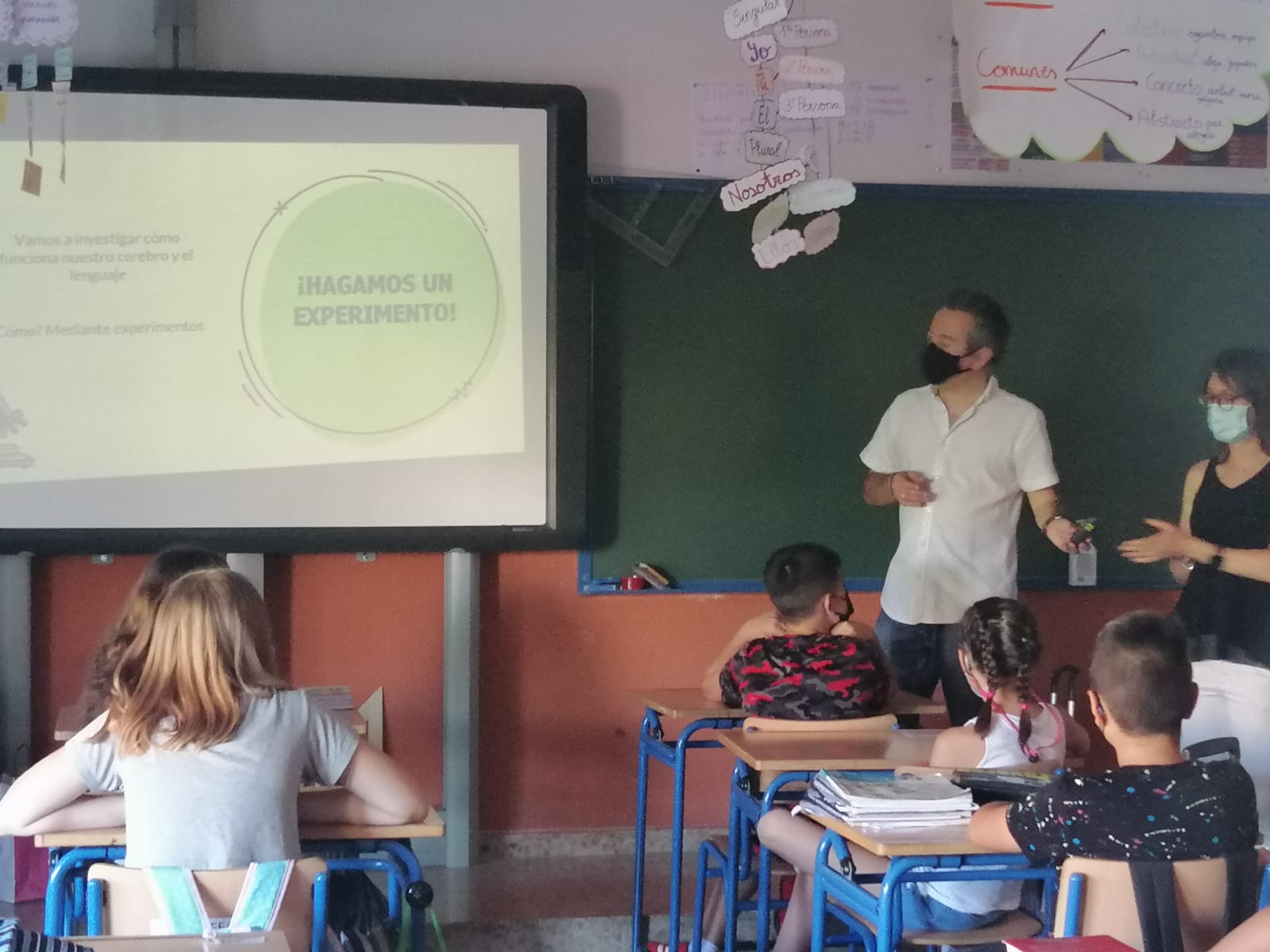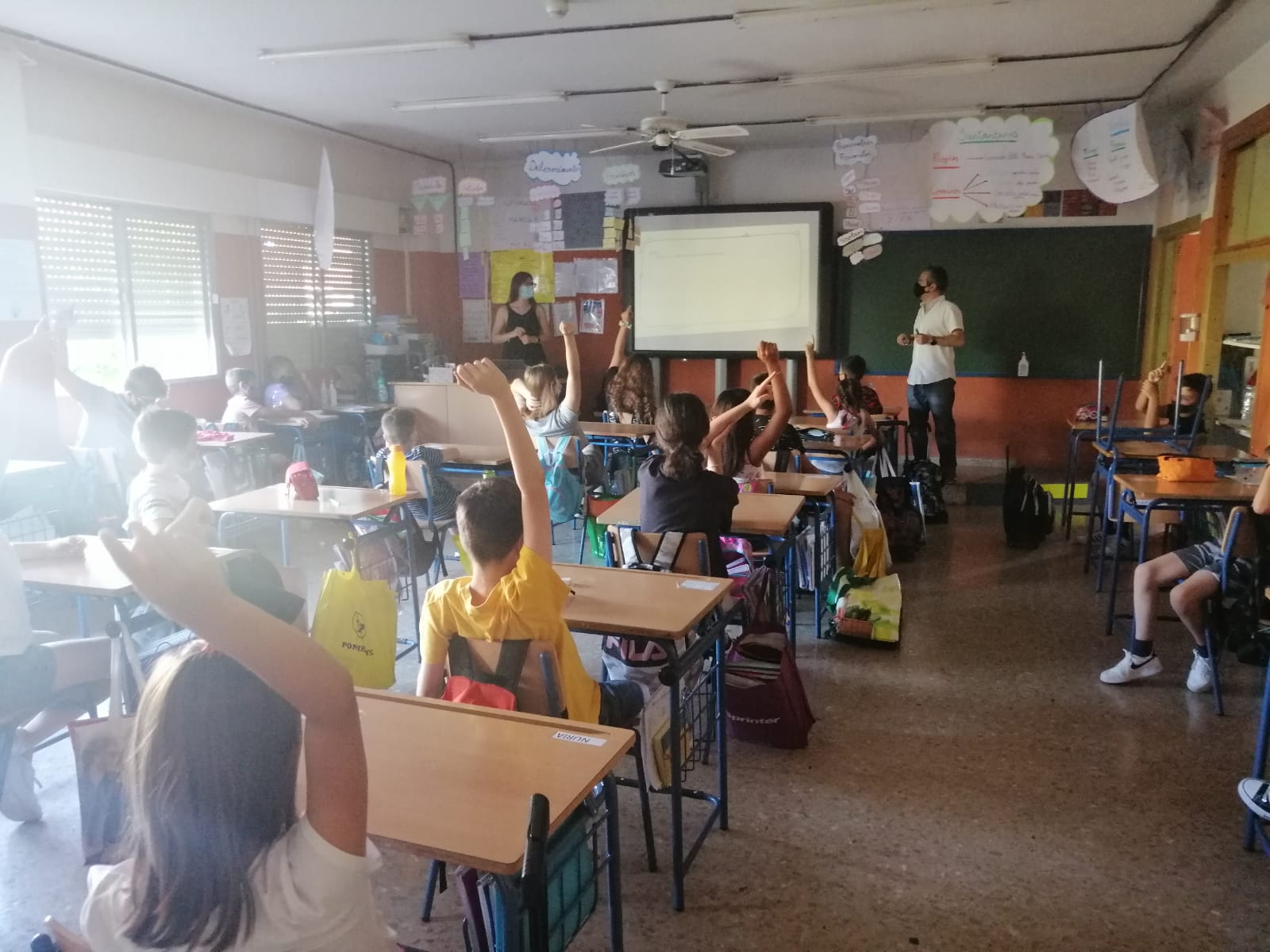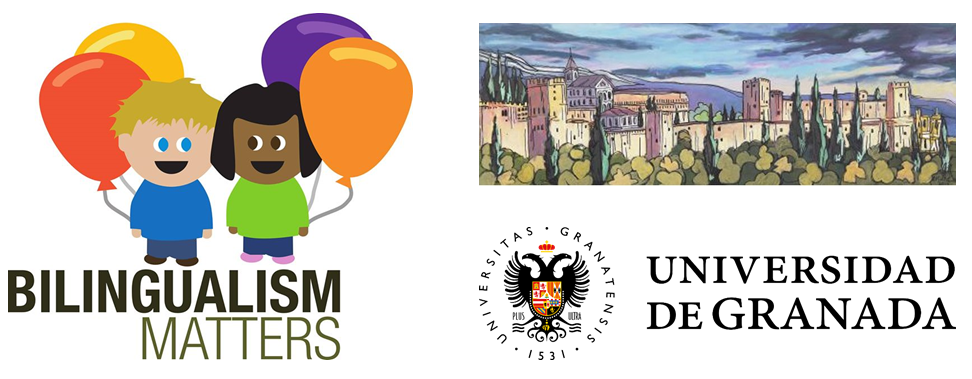Los días 10 y 11 de junio, tres miembros de Bilingualism Matters UGR (Cristóbal Lozano, Teresa Quesada y Elena García-Guerrero) visitaron el CEIP Profesor Tierno Galván de Armilla en la provincia de Granada para impartir unas sesiones divulgativas sobre el lenguaje, el cerebro y la investigación científica. El evento se tituló Lenguaje, mente y experimentos: Aprendiendo cómo funciona un experimento lingüístico y se llevó a cabo dentro del proyecto “¿Cómo conviven dos idiomas en el cerebro? Transfiriendo la investigación desde el laboratorio a la sociedad” (FCT-19-15358), financiado por el FECYT y el Ministerio de Ciencia e Innovación.
Las charlas fueron dirigidas a alumnos de 4º y 5º de educación primaria, sumando un total de cuatro aulas. El objetivo fue hacer pensar a los niños sobre cómo procesamos mentalmente el lenguaje y darles a conocer, de manera sencilla y divertida, en qué consiste un experimento psicolingüístico. En primer lugar, se les plantearon preguntas para generar debate y conocer sus intuiciones y conocimiento acerca de la temática. A continuación, los alumnos participaron activamente en tres experimentos sencillos: dos experimentos clásicos de psicolingüística (palabras inventadas y Stroop) y uno más relacionado con nuestra área de investigación (resolución de anáfora). Una vez concluía cada uno de ellos, se les hacía reflexionar sobre lo que había pasado y lo que podíamos aprender de ello.
A raíz de estos experimentos, que para los alumnos eran casi juegos, surgieron preguntas muy interesantes. Nos sorprendió la capacidad que tuvieron para sacar conclusiones sobre el procesamiento del lenguaje, ¡muchas de ellas muy acertadas! De hecho, una alumna de 4º de primaria comentó un aspecto muy concreto que uno de los miembros de Bilingualism Matters UGR, Fernando Martín-Villena, está analizando en su tesis doctoral. ¡El nivel estaba por las nubes! La actividad concluyó dándoles a los alumnos un pequeño detalle: un bolígrafo para que recuerden la importancia del lenguaje. Fue una actividad muy enriquecedora no solo para los alumnos, que pudieron reflexionar sobre aspectos que no suelen comentarse en las aulas, sino también para los miembros de nuestro equipo. El evento tuvo muy buena acogida y los alumnos participaron mucho. Con esto quedó cumplido nuestro objetivo principal: promover la ciencia y sembrar la curiosidad científica en los niños. ¡Quizás en unos años algunos de ellos se animen a ser científicos también!
The past 10th and 11th of June, three members of Bilingualism Matters UGR (Cristóbal Lozano, Teresa Quesada, and Elena García-Guerrero) visited Profesor Tierno Galván Elementary located in Armilla (Granada) to conduct workshops about language, the brain, and scientific research. The event, titled Language, Brain and Experimentos: Learning how a psycholinguistic experiment works, was carried out within the project “How do languages co-exist in the brain? Relaying evidence from the laboratory to our society” (FCT-19-15358), financed by the Spanish Foundation of Science and Technology (FECYT) and the Ministry of Science and Innovation.
The workshops were put on for 4th and 5th graders, with a total of four classes. The main objective was to make the children think about how we mentally process language and to show them, in an easy and fun way, what a psycholinguistic experiment is all about. Firstly, some questions were raised to promote discussion and to establish a baseline for the children’s intuitions and knowledge about these topics. Afterwards, they actively participated in three simple experiments: two classic psycholinguistic experiments (nonce words and Stroop) and a third one related to our field of research (anaphora resolution). After each experiment, we made the children reflect about what had happened and what we could learn from it.
These experiments, that the children perceived of as games, fostered a number of really interesting questions. We were surprised by their capacity of reaching conclusions about how language is processed; many of them were very accurate with their statements! In fact, one girl commented on an element that is actually the main focus of the PhD thesis of our colleague and BM team member Fernando Martín-Villena. The level was amazing! This activity concluded by giving these children a little gift: a pen to remember how important language is. This was an enriching event not only for the students, who had the opportunity to reflect on topics that are not frequently discussed in a classroom, but also for the members of our team. The event was very well received and the children participated a lot. This way, our main objective was fulfilled: to promote science and foster scientific curiosity among children. Maybe some of them will end up being scientists one day!


